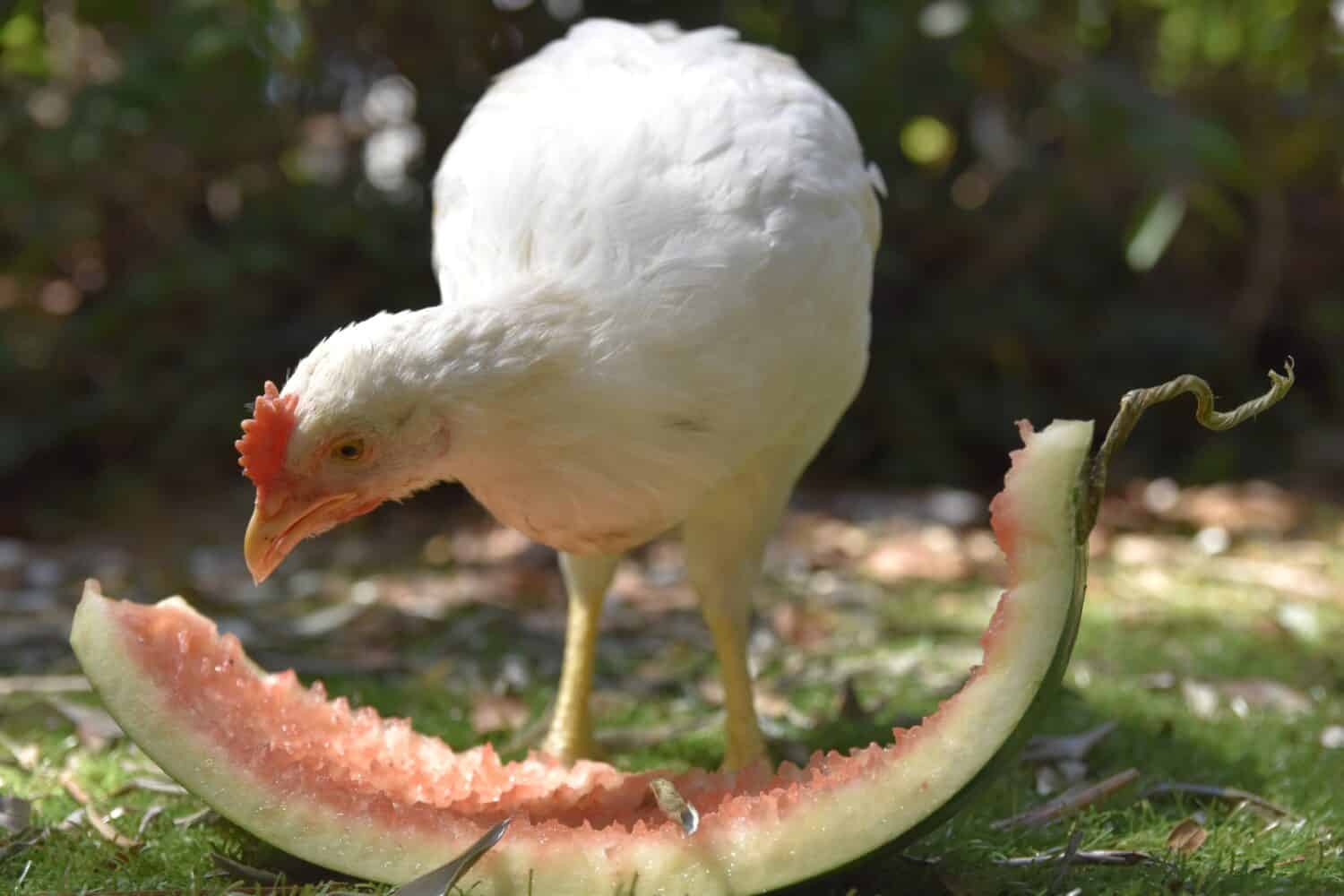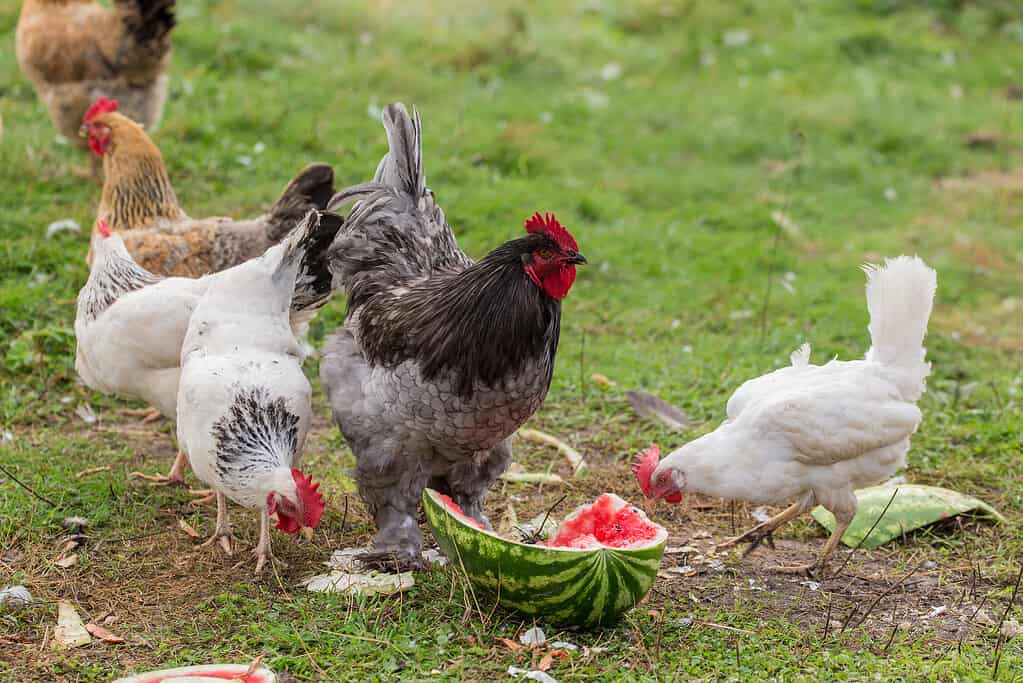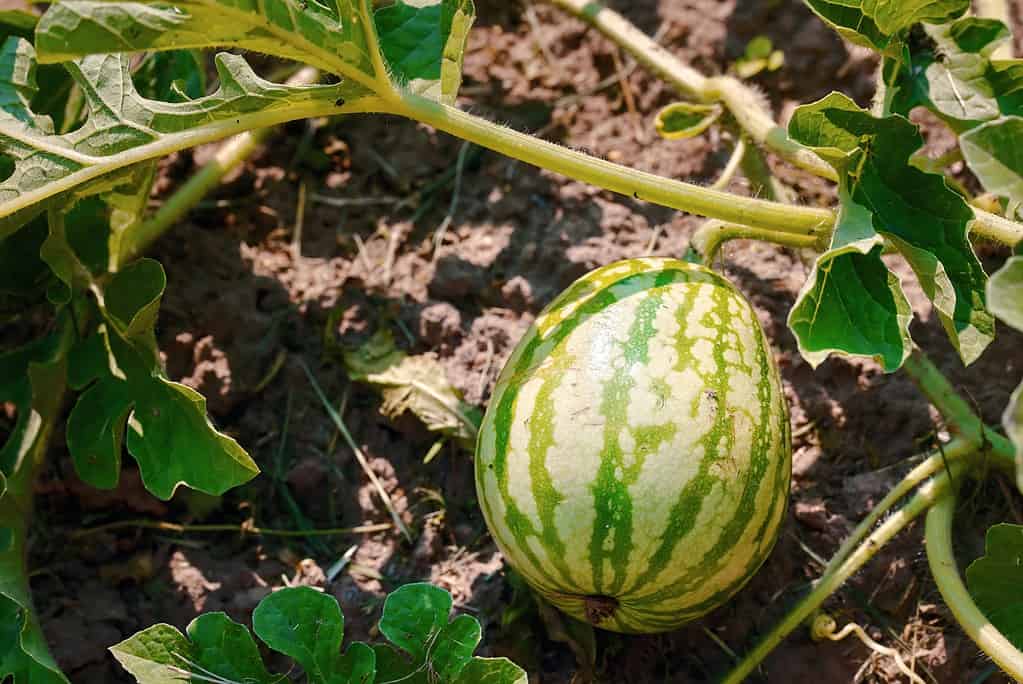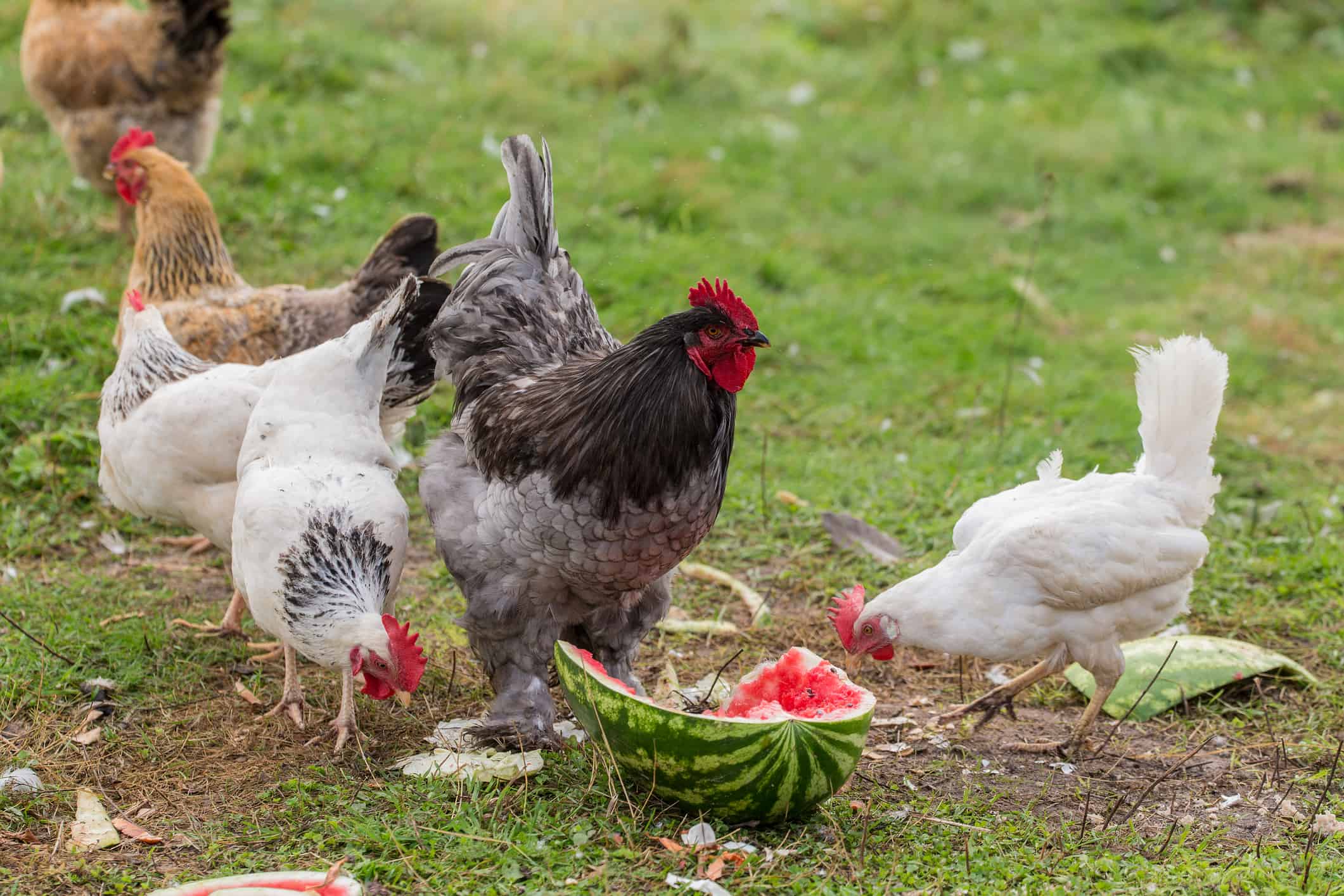People who keep small flocks of chickens often supplement their diet with table scraps. Chickens love these treats, and some of their favorite foods include fresh fruits and vegetables. You may wonder, can chickens eat watermelon? Yes! Chickens can definitely eat watermelon, and they will eat virtually every part from the seeds to the rind. Owners should offer their chickens fruits like watermelon in moderation. Also, watermelon can get messy, so owners should offer it separately from the regular chicken feed. Read on to learn more about feeding chickens watermelon, the health benefits, and whether this juicy fruit can cause any problems.
Can Chickens Eat Watermelon?

Chickens love watermelon and they will eat the seeds, the flesh, and even peck at the rind.
©Hilave/Shutterstock.com
Watermelon is among the many table scraps chickens can safely eat in moderation. Watermelon, and other melons such as cantaloupe, honeydew, and others, make excellent treats for chickens. These fruits are not toxic to chickens, and the birds can eat the seeds, the flesh, and even pick at the rind with no problems. Owners should avoid feeding chickens too much watermelon at once, because the sweet fruit does have a high sugar content. Limiting the amount of watermelon to roughly 0.25 cups per chicken per day will help keep things in balance.
What Nutrients Does Watermelon Provide?
Watermelon is rich in antioxidants, including lycopene, which can help protect against cancer and cardiovascular disease. It also has Vitamin A, Vitamin C, Vitamin B6, potassium and magnesium. Watermelon provides a good source of fiber as well as a small amount of protein. One amino acid found in watermelon rind, L-citrulline, helps reduce the body temperature of chickens. This, along with the abundant water in the fruit, can help prevent heat stress in chickens during the summer.
How Much Watermelon Can Chickens Have?
Owners should feed their chickens a diet consisting of 90 percent high quality, balanced commercial feed and 10 percent healthy treats, according to Purina Mills, an industry leader in poultry nutrition. Laying hens should receive approximately 0.25 pounds of feed per day, which equals about 0.5 cups. That means, at most, owners should feed each chicken only about 2 tablespoons of various treats, such as watermelon, each day. Depending on how many birds an owner has, the amount of watermelon offered to the flock can vary.
| Balanced Feed | Treats | |
|---|---|---|
| Percent | 90 percent | 10 percent |
| Amount | 0.25 pounds or 0.5 cups | 2 tablespoons |
Can You Feed Chickens Watermelon Every Day?
Chickens should ideally receive a variety of different types of treats to maximize the different nutrients in their diet. Owners should include leafy green treats rather than only offering sweet fruits every day. However, with a water content of around 92 percent, watermelon does have the added benefit of giving the flock increased hydration, so it makes an excellent summertime treat. Watermelon may be a perfect daily treat when the weather is hot and dry, but try to mix things up at other times.
Can Feeding Chickens Too Much Watermelon Cause Problems?
Feeding chickens too much sweet, sugary fruit such as watermelon can cause digestive problems including diarrhea. Watch out for a change in your birds’ poop. A loose or watery consistency can be a sign of trouble. If your chickens develop diarrhea from eating too much watermelon, cut back on how much you offer.
Some chicken breeds are prone to obesity or even diabetes. Try not to feed your chickens too much watermelon and other sweet treats, especially if they seem to put on excess weight. Remember that even though watermelon has lots of healthy nutrients, it also has a high sugar content. Your chickens will benefit from keeping all treats, especially sweet ones, limited to no more than 10 percent of their daily diet, or just a couple of tablespoons per bird per day.
Benefits of Feeding Chickens Watermelon

Watermelon provides a variety of nutrients to chickens and helps them stay hydrated in the heat.
©Argument/iStock via Getty Images
One of the greatest benefits of feeding watermelon to chickens is how well it hydrates them, especially during the hottest days of the year. The L-citrulline in the watermelon rind also helps keep the birds cooler because it naturally lowers their body temperature.
Watermelon has high levels of Vitamin C, Vitamin A, and Vitamin B6, along with potassium and magnesium. Vitamin C helps to boost the immune system. Vitamin A positively impacts vision, growth, and skin health. Vitamin B6 promotes the generation of red blood cells and helps maintain hormone regulation and the immune system. The potassium in watermelon promotes good muscle function and helps reduce heat stress. And magnesium promotes metabolism and good bone health.
Chicks Can Eat Small Amounts of Watermelon
Adult chickens can tolerate sweet treats such as watermelon in varying amounts, but owners should take extra care when feeding these treats to chicks. Some owners say chicks can start receiving treats like watermelon in very small amounts as young as five weeks. Others suggest waiting a bit longer. Make sure if you do offer watermelon to chicks, you do so in very small amounts.
The nutritionists at Purina Mills recommend waiting until chickens reach 18 weeks of age, or until hens lay their first egg, before regularly offering treats. Young chicks need lots of nutrients. A high quality, balanced feed provides all the nutrients they need. However, offering too many treats early in their development may cause chicks to refuse their feed. This could prevent them from getting the balanced nutrition they need for healthy growth.
Never Feed Chickens Moldy or Fermented Watermelon

Only feed chickens watermelon that you would eat. Avoid moldy, rotten, or fermented melons.
©Tricky_Shark/Shutterstock.com
Watermelons had a viral moment late in the summer in 2023. People posted videos of swollen, leaking, and even exploding melons they had bought at the store. Experts said exposure to the extreme summer heat cause the melons to ferment. Needless to say, humans were not keen on eating these fermented, rotten watermelons. Nor should they have given them to chickens or other livestock.
Owners of chickens should know the many toxic foods chickens should not eat. These include all moldy or rotten fruits and vegetables. Some types of mold can harm or even kill chickens. As a rule, you should never feed chickens any fruit that you wouldn’t feel safe eating yourself. This includes moldy or rotten watermelon, other melons, and other types of fruits.
Remove Uneaten Watermelon to Avoid Pests

Avoid leaving out watermelon if you don’t want to draw other animals and pests.
©Landshark1/Shutterstock.com
Most chickens love watermelon and will gobble it right up. They generally start with the seeds, then eat the tender flesh, and finally peck at the rind. Watermelon is especially juicy and can make a huge, sticky mess. It is best offered separately from other feed and outside the chicken coop. Make sure to remove any uneaten watermelon rind after your birds have finished pecking at it to avoid drawing pests.
Watch for Signs of Digestive Problems and Allergies
Chickens can sometimes, rarely, have allergic reactions to various treats. Diarrhea is the most common effect of feeding too much watermelon. Watch out for any more serious reactions. Try introducing new treats, such as watermelon, one food at a time. If your chicken have signs of allergic reactions or acute digestive issues after receiving any new treats, stop offering that food immediately and provide plenty of water. Seek medical attention from your veterinarian if any of your birds show signs of an acute allergic reaction, including serious skin rashes, difficulty breathing, watery stools, or any other symptom that causes you alarm.
Thank you for reading! Have some feedback for us? Contact the AZ Animals editorial team.








